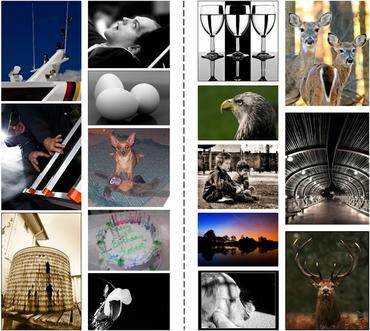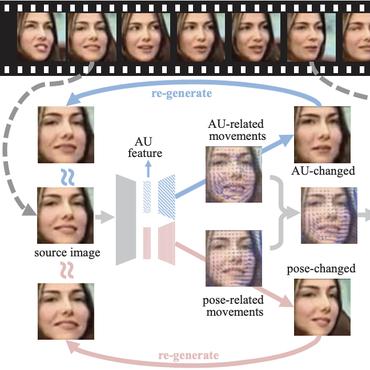Search Results for author: Wei-Ming Dong
Found 19 papers, 5 papers with code
Dynamic Refinement Network for Oriented and Densely Packed Object Detection
1 code implementation • CVPR 2020 • Xingjia Pan, Yuqiang Ren, Kekai Sheng, Wei-Ming Dong, Haolei Yuan, Xiaowei Guo, Chongyang Ma, Changsheng Xu
However, the detection of oriented and densely packed objects remains challenging because of following inherent reasons: (1) receptive fields of neurons are all axis-aligned and of the same shape, whereas objects are usually of diverse shapes and align along various directions; (2) detection models are typically trained with generic knowledge and may not generalize well to handle specific objects at test time; (3) the limited dataset hinders the development on this task.
LGM-Net: Learning to Generate Matching Networks for Few-Shot Learning
1 code implementation • 15 May 2019 • Huaiyu Li, Wei-Ming Dong, Xing Mei, Chongyang Ma, Feiyue Huang, Bao-Gang Hu
The TargetNet module is a neural network for solving a specific task and the MetaNet module aims at learning to generate functional weights for TargetNet by observing training samples.
Attention-based Multi-Patch Aggregation for Image Aesthetic Assessment
1 code implementation • ACM Multimedia Conference 2018 • Kekai Sheng, Wei-Ming Dong, Chongyang Ma, Xing Mei, Feiyue Huang, Bao-Gang Hu
Aggregation structures with explicit information, such as image attributes and scene semantics, are effective and popular for intelligent systems for assessing aesthetics of visual data.
 Ranked #1 on
Aesthetics Quality Assessment
on AVA
Ranked #1 on
Aesthetics Quality Assessment
on AVA
Arbitrary Style Transfer via Multi-Adaptation Network
2 code implementations • 27 May 2020 • Yingying Deng, Fan Tang, Wei-Ming Dong, Wen Sun, Feiyue Huang, Changsheng Xu
Arbitrary style transfer is a significant topic with research value and application prospect.
Gourmet Photography Dataset for Aesthetic Assessment of Food Images
1 code implementation • SIGGRAPH Asia 2018 2018 • Kekai Sheng, Wei-Ming Dong, Haibin Huang, Chongyang Ma, Bao-Gang Hu
In this study, we present the Gourmet Photography Dataset (GPD), which is the first large-scale dataset for aesthetic assessment of food photographs.
Image Retargetability
no code implementations • 12 Feb 2018 • Fan Tang, Wei-Ming Dong, Yiping Meng, Chongyang Ma, Fuzhang Wu, Xinrui Li, Tong-Yee Lee
In this work, we introduce the notion of image retargetability to describe how well a particular image can be handled by content-aware image retargeting.
A study on cost behaviors of binary classification measures in class-imbalanced problems
no code implementations • 26 Mar 2014 • Bao-Gang Hu, Wei-Ming Dong
Based on their cost functions, we are able to conclude that G-means of accuracy rates and BER are suitable measures because they show "proper" cost behaviors in terms of "a misclassification from a small class will cause a greater cost than that from a large class".
Weakly-Supervised Deep Convolutional Neural Network Learning for Facial Action Unit Intensity Estimation
no code implementations • CVPR 2018 • Yong Zhang, Wei-Ming Dong, Bao-Gang Hu, Qiang Ji
Facial action unit (AU) intensity estimation plays an important role in affective computing and human-computer interaction.
Classifier Learning With Prior Probabilities for Facial Action Unit Recognition
no code implementations • CVPR 2018 • Yong Zhang, Wei-Ming Dong, Bao-Gang Hu, Qiang Ji
To alleviate this issue, we propose a knowledge-driven method for jointly learning multiple AU classifiers without any AU annotation by leveraging prior probabilities on AUs, including expression-independent and expression-dependent AU probabilities.
Bilateral Ordinal Relevance Multi-Instance Regression for Facial Action Unit Intensity Estimation
no code implementations • CVPR 2018 • Yong Zhang, Rui Zhao, Wei-Ming Dong, Bao-Gang Hu, Qiang Ji
The majority of methods directly apply supervised learning techniques to AU intensity estimation while few methods exploit unlabeled samples to improve the performance.
"Ge Shu Zhi Zhi": Towards Deep Understanding about Worlds
no code implementations • 19 Dec 2018 • Bao-Gang Hu, Wei-Ming Dong
"Ge She Zhi Zhi" is a novel saying in Chinese, stated as "To investigate things from the underlying principle(s) and to acquire knowledge in the form of mathematical representations".
Segment-Tree Based Cost Aggregation for Stereo Matching
no code implementations • CVPR 2013 • Xing Mei, Xun Sun, Wei-Ming Dong, Haitao Wang, Xiaopeng Zhang
Instead of employing the minimum spanning tree (MST) and its variants, a new tree structure, "Segment-Tree", is proposed for non-local matching cost aggregation.
UniHIST: A Unified Framework for Image Restoration With Marginal Histogram Constraints
no code implementations • CVPR 2015 • Xing Mei, Wei-Ming Dong, Bao-Gang Hu, Siwei Lyu
Marginal histograms provide valuable information for various computer vision problems.
Incremental Concept Learning via Online Generative Memory Recall
no code implementations • 5 Jul 2019 • Huaiyu Li, Wei-Ming Dong, Bao-Gang Hu
The main reason for catastrophic forgetting is that the past concept data is not available and neural weights are changed during incrementally learning new concepts.
 Class Incremental Learning
Class Incremental Learning
 Generative Adversarial Network
+1
Generative Adversarial Network
+1
Revisiting Image Aesthetic Assessment via Self-Supervised Feature Learning
no code implementations • 26 Nov 2019 • Kekai Sheng, Wei-Ming Dong, Menglei Chai, Guohui Wang, Peng Zhou, Feiyue Huang, Bao-Gang Hu, Rongrong Ji, Chongyang Ma
In this paper, we revisit the problem of image aesthetic assessment from the self-supervised feature learning perspective.
Multi-Attribute Guided Painting Generation
no code implementations • 26 Feb 2020 • Minxuan Lin, Yingying Deng, Fan Tang, Wei-Ming Dong, Changsheng Xu
Controllable painting generation plays a pivotal role in image stylization.
Distribution Aligned Multimodal and Multi-Domain Image Stylization
no code implementations • 2 Jun 2020 • Minxuan Lin, Fan Tang, Wei-Ming Dong, Xiao Li, Chongyang Ma, Changsheng Xu
Currently, there are few methods that can perform both multimodal and multi-domain stylization simultaneously.
Arbitrary Video Style Transfer via Multi-Channel Correlation
no code implementations • 17 Sep 2020 • Yingying Deng, Fan Tang, Wei-Ming Dong, Haibin Huang, Chongyang Ma, Changsheng Xu
Towards this end, we propose Multi-Channel Correction network (MCCNet), which can be trained to fuse the exemplar style features and input content features for efficient style transfer while naturally maintaining the coherence of input videos.
A design of human-like robust AI machines in object identification
no code implementations • 7 Jan 2021 • Bao-Gang Hu, Wei-Ming Dong
Similar to the perspective, or design, position by Turing, we provide a solution of how to achieve HLR AI machines without constructing them and conducting real experiments.







